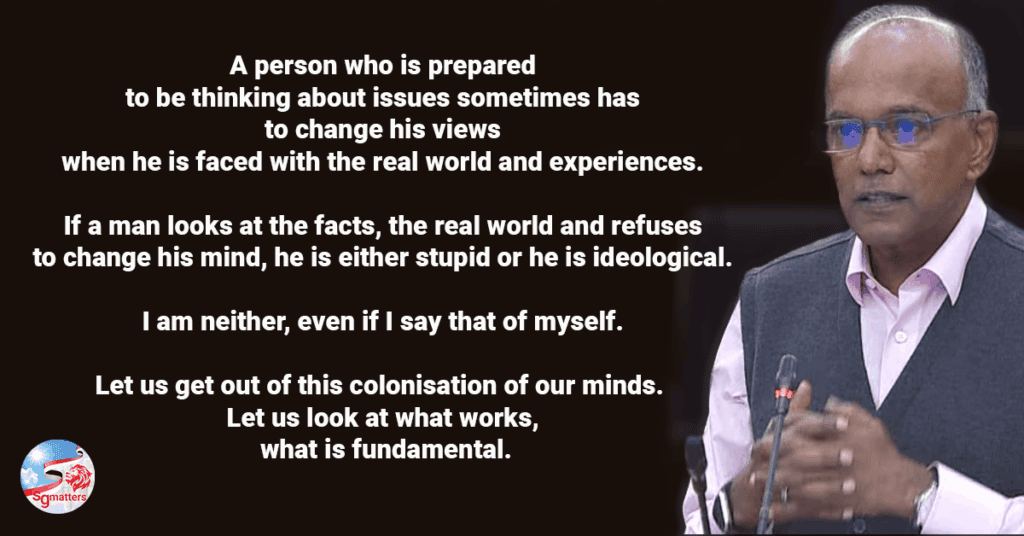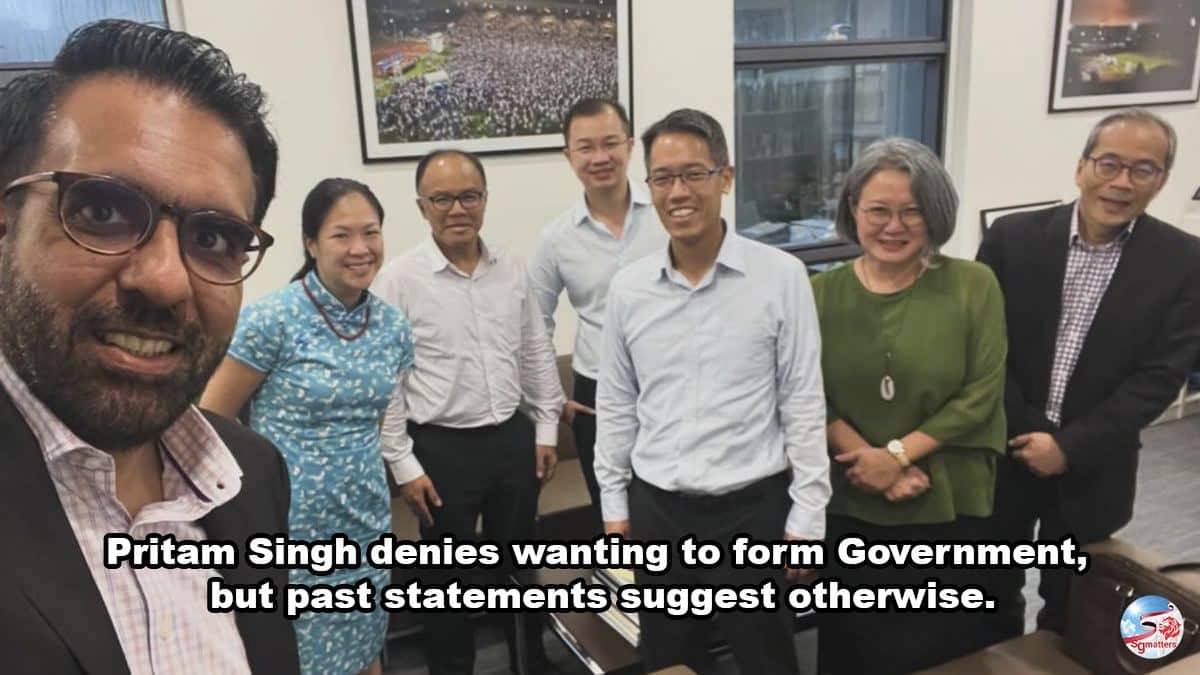“A person who is prepared to be thinking about issues sometimes has to change his views when he is faced with the real world and experiences. If a man looks at the facts, the real world and refuses to change his mind, he is either stupid or he is ideological. I am neither,” said Law Minister K Shanmugam.
In the debate on FICA, Leader of the Opposition, Mr Pritam Singh quoted Mr K Shanmugam with reference to the debate on the Internal Security Act (ISA) (Amendment) Bill, on 25 January 1989, which sought to abolish appeal to the Privy Council in case of review of ISA cases.
Then a young lawyer and backbencher, Mr Shanmugam had expressed concerns over the powers that the Government had.
Here is an excerpt of Mr Shanmugam’s response to Mr Pritam Singh in Parliament on 5 October 2021:
I did not only say it in 1989. If you went back and checked, I think I have said it at various points – 1989, 1990. I have said it in respect of the original MRHA. I have said it in respect of the CLTPA and I have said it in respect of the Internal Security Act.
I have given this answer to your colleague, Mr Dennis Tan, when he asked me, probably trying to suggest that I am being inconsistent.
A person who is prepared to be thinking about issues sometimes has to change his views when he is faced with the real world and experiences.
In 1989, I was a lawyer four years out of law school, four years after being called, and like many other lawyers, my assumption was every problem, the solution is in the Courts. Just like Mr Pritam Singh and others, I also take the separation of powers very seriously. The constitutional principles, the independence of the judiciary, all of these, I take very seriously. We imbibed this in law school.
I believed in it, I believe in it and I believe we try and uphold it. So, any time when there is an approach that seeks to cut back on judicial review or take away the powers of the judiciary, my instinctive reaction is negative. I do not like it, I do not want to do it and I instinctively try and see if there is a different way of doing it.
Which is why when the MRHA was originally brought in, I expressed my discomfort within the bounds of what is possible for the backbenched Members of Parliament of the ruling party. Likewise, I expressed my concerns about the CLTPA. Likewise, I expressed my concerns about the Internal Security Act.
Likewise, today, I said, if we can find a better model, I will be the first one to do it. Tell me a better model. Going to the High Court for FICA is not a better model.
I think, Mr Pritam Singh, based on what he says, he obviously does not deny that there will be leaks. Do you want us to take the risks?
Will there be a possibility of a leak with a Tribunal? Much, much, much less. To the point of being close to zero. That is the big difference.
What has made me change my mind? If a man looks at the facts, the real world and refuses to change his mind, he is either stupid or he is ideological. I am neither. I think. Even if I say that of myself.
So, you see 9/11. You look at the way the Americans have dealt with it. You see the issues in Western Europe. You see the issues around the world where lip service is paid to all these grand concepts but the societies live in utter misery, where the rule of law is a concept for lawyers but it does not operate in the real world.
So, I look at all of this experience practising in the Courts and too many years as a Member of Parliament. Long conversations with the late Mr Lee Kuan Yew, discussing, I would say arguing though it is not easy to argue with him, discussing, tough discussions and then I began to understand the meaning of his original speech to the Law Society when he said, “Law and order, I reverse it. Order first, before law.” Because if you do not have order, you cannot have law.
When we all read it, we think we understand it. But I do not think we really do. You need to really imbibe what is the meaning of that. If you cannot have the CLTPA and arrest the gangsters, how are you going to have law? It will be a paper law. But if you can bring order into society, then your law will take full effect.
Look at the state of our society. Look at the number of people under the CL today compared to the number of people under the CL even 10 years ago. It is halved and the reason is as society develops, as society progresses, as there is stability, as there is order, the law takes stronger and stronger roots. You get that wrong, you will neither have law nor order.
So, I began to understand why we have a strong commitment to the rule of law, a strong commitment to the separation of powers and at the same time, over time, in specific areas. For example, I said the Land Acquisition Act. Your property could be worth millions of dollars. The Government could acquire it and you could be asked to leave. It is socialism in action. It is a social policy and there is a need for that. Even today.
Would we in Singapore be where we are if we had taken the Indian approach and every matter goes up to the Supreme Court on land acquisition and it takes years to deal with it?
So, I saw the genius in the adaptations that our system has made or the founding generation has made, being very strict in building up our judiciary.
You look at all the countries in the postcolonial world. They inherited the institutions from the British – a civil service, a judiciary, laws, schools, education. What have they done with it? Most of them have gone down the tube while they have grand rhetoric.
What has Mr Lee and his team done with it? Built-up the judiciary. If we do not have a commitment to the rule of law, do you think our judiciary will be ranked as it is today? Internationally?
Built-up our civil service so that it is a strong, outstanding, excellent civil service. Built-up the other institutions, including SAF, the Police force, our education system, our middle class. All of these were built up with the foundations of bringing order first and making sure that the law and the commitment to the rule of law are there.
But making the exceptions where necessary and I took you through the exceptions.
To me, the best example of how this operated in practice is when I saw how the Americans were struggling with it. They had an ideological commitment to due process. Everyone must be trialed. Everyone must have a lawyer. Everyone must be given a full trial.
But then, they have these, I do not know, hundreds or a thousand plus terrorists whom they do not want to give a trial to. America was never under an existential threat as a result of 9/11, never like the threat that we faced. But when they did it, they said Guantanamo Bay is in Cuba, our rules and laws do not apply there, there is no due process, we lock them up and we throw away the keys.
That is why I said, let us get out of this colonisation of our minds. Let us look at what works, what is fundamental. Checks and balances are important. But what is wrong with the checks and balances we have built-in here?
So, yes, I am not embarrassed to say that I had certain views, straight out of law school the first four years. The only mistake is I should not have become a Member of Parliament when I was 29 years old. I should have waited a bit longer.
But I am not embarrassed to say those were my views and those views have changed because of the realities of life, not because I became a Minister but because over time, long before I became a Minister, I saw how laws are meant to operate and where the exceptions have to be made.
So, as I sat with my officers and drafted this and with the AGC, yes, there were parts that I wished were different. But that threat we face, as I said, are people armed with bazookas and I described this legislation as a toy gun. Because Singapore believes in the law, so we put forward the law, we give ourselves legal powers, but in reality, the kind of threats we face, the kind of adversaries and the resources they have in terms of manpower are far greater than what we have.
So, that, and our people have not even begun to realise what the problem is and the nature of the problem despite all the speeches and the conferences and the seminars and the Select Committee hearings.
If anybody else from the Workers’ Party wishes, I will give you the references to my different speeches where I have expressed my views so that I do not have to keep coming back to the speech once every year or two years.
[irp posts=”9362″ name=”Pritam Singh echoes view that Singapore must remain open”]





